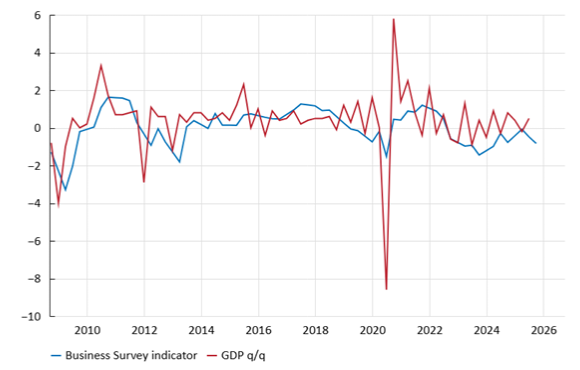Sweden Riksbank Preview (Nov 5): Board to Reveal Little More?
Having delivered what was described as a final rate cut last time around (ie Sep 23), the Riksbank Board will be pleased with the data flow since. GDP indicators suggest a strong Q3 showing of over 1% q/q while previously troublesome CPI data have softened appreciably thereby confirming suspicions that the prior spike was aberrant. Admittedly, that GDP pick-up may be aberrant too, not least given the still gloomy message from the Riksbank’s own business survey (Figure 1). Still, it would be hard for anyone to suggest that the Board will not keep to its almost explicit promise of no change, most definitely at the looming Nov 5 decision with the lack of any scheduled updated projections making the policy outlook beyond still uncertain. Even so, we still go along with the Riksbank thinking although it may have to revise any suggestion that the hefty tax cuts dished out into 2027 as the recent Budget envisages will have no inflationary consequences. Regardless, we do not see any looming policy reversal, as we see this current policy rate (1.75%) staying in place into 2027.
Figure 1: Still Soggy Business Survey indicator

Source; Riksbank, GDP Index figures and quarterly change in per cent respectively
As for fiscal policy, it will now be expansionary into 2026 which is an election year. The measures include (1.9% of GDP) of unfunded reforms for next year, which include: military support, defence rearmament and a regular measure. Regardless, it now seems all the clearer that the CPI spike seen in the July data was aberrant even though it partly persisted into August. Indeed, that spike was almost certainly a reflection of temporary factors, most notably energy price swings, alongside what may be a more sustained but far from demand-driven recent tripling in food inflation. To us, the underlying picture is reassuring as seen in the ex-energy CPIF measures is still consistent with target and this is despite the impact on this measure of food inflation, albeit where the latter has slowed from running at over 5% to just over 3% (still something more supply driven and also likely to weigh on spending power). Indeed, the Board view still suggests that ‘several indicators support the view that inflation will fall back to target going forward’. Notably the updated Riksbank CPIF forecast shows inflation well above target through 2028 but this is a result of VAT tax swing induced base effects that anything underlying.
But the real economy backdrop is still puzzling. Despite an apparent 1%-plus q/q Q3 GDP jump (twice Riksbank thinking), the economy still looks soggy, not least in the labor market. But the Riksbank will note the results if its own survey, which underscores that Swedish companies describe the economic situation as a long and protracted slump that has not improved since the spring and where industrial activity has weakened. In particular, the survey stresses that high unemployment is also weighing on expectations and is described as “the biggest challenge”. In addition, many respondents wonder whether households will continue to be cautious about consumption for a longer period. As a result, the subdued mood is reflected in the Business Survey indicator, which summarises the Riksbank’s Survey’s results (Figure 1). The indicator has weakened since May and remains below its historical average, as it has done since the end of 2022. The jury is out – still!
I,Andrew Wroblewski, the Senior Economist Western Europe declare that the views expressed herein are mine and are clear, fair and not misleading at the time of publication. They have not been influenced by any relationship, either a personal relationship of mine or a relationship of the firm, to any entity described or referred to herein nor to any client of Continuum Economics nor has any inducement been received in relation to those views. I further declare that in the preparation and publication of this report I have at all times followed all relevant Continuum Economics compliance protocols including those reasonably seeking to prevent the receipt or misuse of material non-public information.